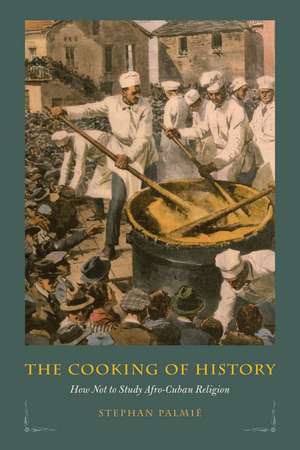The Cooking of History: How Not to Study Afro-Cuban Religion
Autor Stephan Palmiéen Limba Engleză Paperback – iul 2013
Over a lifetime of studying Cuban Santería and other religions related to Orisha worship—a practice also found among the Yoruba in West Africa—Stephan Palmié has grown progressively uneasy with the assumptions inherent in the very term Afro-Cuban religion. In The Cooking of History he provides a comprehensive analysis of these assumptions, in the process offering an incisive critique both of the anthropology of religion and of scholarship on the cultural history of the Afro-Atlantic World.
Understood largely through its rituals and ceremonies, Santería and related religions have been a challenge for anthropologists to link to a hypothetical African past. But, Palmié argues, precisely by relying on the notion of an aboriginal African past, and by claiming to authenticate these religions via their findings, anthropologists—some of whom have converted to these religions—have exerted considerable influence upon contemporary practices. Critiquing widespread and damaging simplifications that posit religious practices as stable and self-contained, Palmié calls for a drastic new approach that properly situates cultural origins within the complex social environments and scholarly fields in which they are investigated.
Preț: 167.39 lei
Preț vechi: 201.21 lei
-17% Nou
Puncte Express: 251
Preț estimativ în valută:
32.03€ • 33.53$ • 26.50£
32.03€ • 33.53$ • 26.50£
Carte indisponibilă temporar
Doresc să fiu notificat când acest titlu va fi disponibil:
Se trimite...
Preluare comenzi: 021 569.72.76
Specificații
ISBN-13: 9780226019567
ISBN-10: 022601956X
Pagini: 368
Dimensiuni: 152 x 229 x 25 mm
Greutate: 0.5 kg
Ediția:New.
Editura: University of Chicago Press
Colecția University of Chicago Press
ISBN-10: 022601956X
Pagini: 368
Dimensiuni: 152 x 229 x 25 mm
Greutate: 0.5 kg
Ediția:New.
Editura: University of Chicago Press
Colecția University of Chicago Press
Notă biografică
Stephan Palmié is professor of anthropology at the University of Chicago. He is the author of Wizards and Scientists: Explorations in Afro-Cuban Modernity and Tradition, and, most recently, coeditor of The Caribbean: A History of the Region and Its Peoples, also published the University of Chicago Press.
Cuprins
Acknowledgments
A Note on Spelling
A Note on Spelling
Introduction. BL2532.S3 or, How Not to Study “Afro”-“Cuban” “Religion”
Chapter 1. On Yoruba Origins, for Example ...
Chapter 2. Fernando Ortiz and the Cooking of History
Chapter 3. Or “Syncretism,” for that Matter ...
Chapter 4. The Color of the Gods: Notes on a Question Better Left Unasked
Chapter 5. Afronauts of the Virtual Atlantic: The Giant African Snail Incident, the War of the Oriatés, and the Plague of Orichas
Coda. Ackee and Saltfish versus Amalá con Quimbombó, or More Foods for Thought
Epilogue
Notes
References
Index
Recenzii
“What does it mean to ‘study something’—like Afro-Cuban religion, for instance? In this wise, witty, and uncommonly erudite book, Stephan Palmié unseats key premises regarding the stability of social science knowledge. Afro-Cuban religion, he shows, is at best an ‘organic hybrid,’ a ‘multiuser domain,’ born of the chance meeting of scholars and practitioners, each in pursuit of their own, self-conscious mysteries. Yet his acute analysis shows us something more: not merely must we live with such uncertainty; we can make it the basis of compelling forms of insight.”
“An excellent dissection and analysis of what the author calls ‘Afro-’ ‘Cuban’ ‘Religion.’ . . . Looking back to the earliest records of the groups that eventually developed the traditions known today as Santería, Lukumi, Orisha Religion, and Yoruba Tradition Religion, Palmié traces the ways scholars and their informants/conversation partners worked together to develop what has become a group of worldwide religious traditions.”
“The book is a chef d’ouevre. Stephan Palmié examines the recipes by which ethnographic animals like religions or history are ‘cooked’: hunted, sliced, prepared, and consumed. The dishes are heated on what Palmié names the ‘ethnographic interface,’ where anthropological recipes and the confections that anthropologists study boil together to constitute the regular fare of social life. It would be enough to have penned the first anthropological history of this interspace, exploring, as Palmié does, the lives and practices of those who regularly consume a menu of ‘Afro,’ ‘Cuban,’ and ‘religion.’ This book does much more, serving up a radical critique of anthropological knowing and its time-honored techniques of cookery and, dare we say it, crockery. Brilliantly iconoclastic, Palmié tosses even the unsavory ethnographer into the pot.”
“Stephan Palmié has brought forth once more a work of stunning originality that is certain to have a lasting impact on the study of Afro-Cuban religion and, more generally, the whole field of Afro-American cultural formation. Part auto-ethnography of self-making, part historical ethnography of Afro-Cuban worldmaking, and part homage to the progenitors and bearers of the tradition—with a pinch of chaos and fractal theory thrown in for good measure—The Cooking of History turns ‘cooking’ into a ‘turning,’ a turning upside down of the stale, conventional story based on the idea of cultural holism, and replaces the idea of cultural endowment and transmission with the idea of an analytic space or ‘ethnographic interface’ as the locus of the creation of the episteme called ‘Afro-Cuban religion.’ Palmié has thrown down a most formidable challenge. Now let the fireworks begin!”
